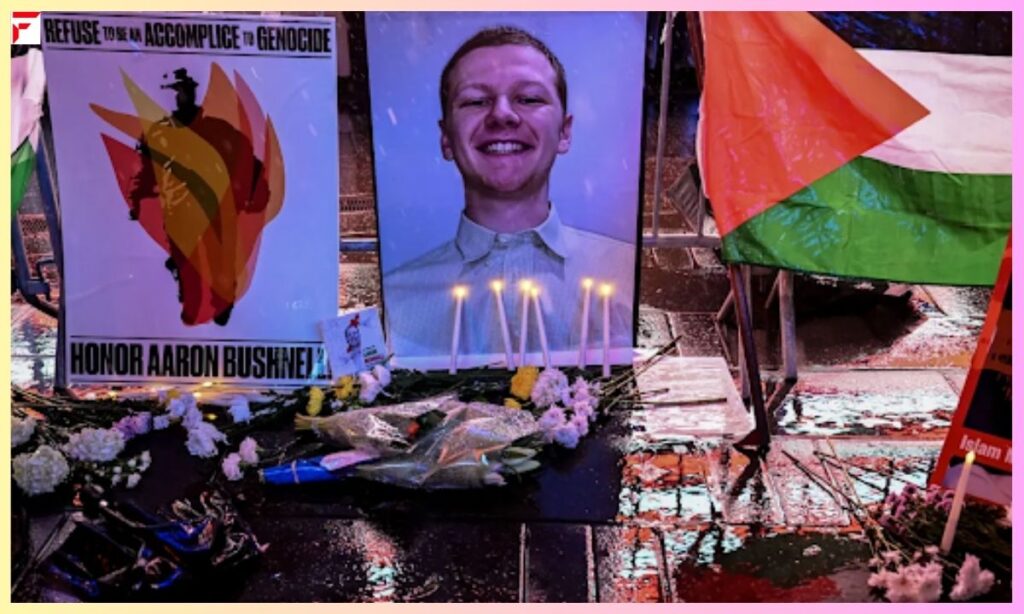The self-immolation of the U.S. Air Force member Aaron Bushnell outside the Israeli embassy in Washington D.C. on February 25, 2024, marked a profound moment in American protest history.
The incident highlighted the growing tension between military service members’ duties and their personal convictions regarding U.S. foreign policy. Bushnell’s dramatic protest brought unprecedented attention to the Palestinian cause and raised questions about the role of extreme forms of protest in contemporary political discourse.
The Incident and Its Context
On that fateful Sunday afternoon, Aaron Bushnell, dressed in his military uniform, approached the Israeli embassy while livestreaming on Twitch. His deliberate choice of location and timing demonstrated a calculated decision to maximize the impact of his protest.
The 25-year-old software engineer’s actions were preceded by careful planning, including recording final statements and arranging for the event to be broadcast live.The protest occurred during a period of heightened tensions surrounding the Israel-Hamas conflict.
Bushnell’s decision to perform this act at the Israeli embassy specifically targeted the symbolic center of Israeli presence in the United States, making a powerful statement about American military involvement and support for Israeli policies.
Understanding Bushnell’s Actions

Contrary to initial media narratives suggesting mental illness, Bushnell’s actions aligned with a history of political self-immolation protests. His detailed final statements and methodical planning indicated a deeply considered political act rather than an impulsive decision.
The act drew parallels to historical self-immolation protests, including those during the Vietnam War.Bushnell’s military background and role as a software engineer in the Air Force added significant weight to his protest.
His position within the military system he was protesting against created a powerful contradiction that amplified his message. His actions reflected a growing dissent within military ranks regarding U.S. foreign policy in the Middle East.
Must Read This Article:Richard Goodall: From School Janitor to AGT Champion
The Embassy Scene (April 2024)
The Israeli embassy has become a focal point for ongoing protests since Bushnell’s death. The area has transformed into a memorial site, with constant demonstrations and vigils.
Security measures have been significantly increased, with enhanced Secret Service presence and new barriers installed to prevent similar incidents.His final act of protest against what he termed as genocide in Palestine sent shockwaves through international media and sparked intense discussions about military service, conscience, and political activism.
The embassy grounds now feature a complex interplay of protest elements, including artwork, photographs, and memorial items dedicated to both Bushnell and Palestinian victims. The charred spot where Bushnell self-immolated remains visible, serving as a powerful reminder of his sacrifice and becoming a symbolic gathering point for protesters.
Symbolic Significance

Bushnell’s act has become a powerful symbol in the broader Palestinian solidarity movement. The contrast between his privileged position as an American servicemember and his choice to die in protest has resonated deeply with activists worldwide. His final words, “Free Palestine,” repeated five times while burning, have become a rallying cry at demonstrations.
The physical location of his protest continues to serve as a powerful reminder of the disparities in power between the Israeli state and Palestinian people. The embassy’s fortified structure, protected by American forces, stands in stark contrast to the makeshift protest installations outside its walls.
Also Read This Blog:VNC Distribution Wholesale Disposable Pods Vape: The Future of Vaping
Legacy and Call to Action
The media coverage of Bushnell’s death has evolved from initial shock to more nuanced discussions about the role of extreme protest in political movements. His action has inspired increased activism and renewed attention to the Palestinian cause, particularly among military service members and veterans.
The incident has sparked ongoing debates about U.S. military support for Israel and the moral obligations of service members. Bushnell’s final wish for his ashes to be scattered in a “free Palestine” continues to resonate as a powerful statement about his hopes for future peace and justice.
FAQ,s
Was Aaron Bushnell’s action influenced by mental illness?
Evidence suggests his action was a calculated political protest aligned with his anti-imperialist beliefs rather than a result of mental illness.
What were Bushnell’s final words?
He repeated “Free Palestine” five times while burning, after declaring he would “no longer be complicit in genocide.”
How has security changed at the Israeli embassy since the incident?
Security has been significantly enhanced with increased Secret Service presence, additional barriers, and constant surveillance.
What was Bushnell’s role in the military?
He served as a software engineer in the U.S. Air Force.
What happened to Bushnell’s remains?
According to his will, he requested cremation with hopes that his ashes would eventually be scattered in a free Palestine.
Conclusion
Aaron Bushnell’s self-immolation represents a dramatic escalation in protests against U.S. support for Israeli policies. His final act continues to resonate months after his death, inspiring ongoing discussions about military service, political protest, and international relations.
The incident has become a powerful symbol in the broader movement for Palestinian rights and continues to influence political discourse and activism in the United States and beyond.

Brook is a talented content writer and digital marketer with expertise in SEO, social media management, and online marketing. He excels at creating impactful, data-driven content to help businesses connect with their target audience and achieve measurable outcomes.





